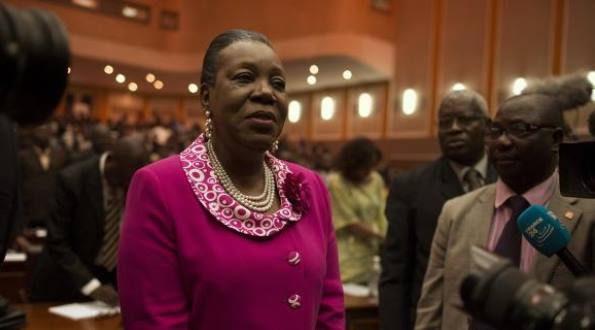BECOME A MEMBER
>JOIN
Catherine Samba-Panza Becomes New Interim President of Central African Republic

Catherine Samba-Panza, Mayor of Bangui, has been elected new interim president of the Central African Republic. Adam Nossiter from the New York Times reported about the first reactions on the spot.
BANGUI, Central African Republic — Cheers broke out in the National Assembly building here on Monday as representatives chose the mayor of this beleaguered capital to serve as the interim president of the Central African Republic, a country in the grip of a sectarian civil war.
Catherine Samba-Panza, 58, will be the first woman to lead the nation, and she will probably serve for a little over a year, with the goal of leading it to national elections. Her appointment came from an unusual assortment of unelected rebel sympathizers, politicians, artists and others who have filled in as a substitute parliament for a nation so fractured that it has suffered a total breakdown of the state in recent months.
Now, hopes are high here that she can halt this impoverished nation’s precipitous “free fall,” as the United Nations secretary general, Ban Ki-moon, put it in a statement on Monday.
There was singing and dancing in the streets of the dilapidated capital on Monday afternoon, and inside the cavernous chamber of the assembly, female spectators broke into joyful shouts, cheers and trilling. The consensus, in the chamber and on the street, was that men had inexorably led the country into a spiral of vicious violence, and that the only hope was for a woman to lead it out.
“Everything we have been through has been the fault of men,” said Marie-Louise Yakemba, who heads a civil-society organization that brings together people of different faiths, and who cheered loudly when the speaker announced Ms. Samba-Panza’s victory. “We think that with a woman, there is at least a ray of hope,” she said.
Ms. Samba-Panza defeated seven other candidates, including the sons of two former presidents and a man whose claim to hold degrees that no other Central Africans possess drew hoots of derision in the assembly chamber on Monday. She was elected in a five-hour process involving two separate hand counts and the double reading-out of all 120-odd members of the assembly.
Beyond the task of reassembling the state and leading it to popular elections next year, she must first try to tamp down the animosity between Muslims and Christians that has resulted in well over 1,000 deaths in the last six weeks alone.
Ms. Samba-Panza, an insurance broker who led state-sponsored reconciliation efforts after a previous civil war, was said by supporters to be untainted by the nine-month reign of terror unleashed under the man she replaced, Michel Djotodia.
Mr. Djotodia, who installed himself as president after leading Muslim rebels in a coup in March, was forced to resign more than a week ago by regional and Western powers for allowing the sectarian bloodshed, which some in the United Nations warn could be the early stages of genocide. There are daily revenge attacks between Christian militias, known as anti-balaka, and the remnants of the Muslim rebels, called Seleka, with most of the violence now coming from the Christians.
The election came the same day that the European Union in Brussels agreed to send hundreds of troops to the troubled country for peacekeeping, a rare flexing of military muscle by a fractious 28-nation bloc that has no permanent army of its own and often prefers exhortation to robust action.
European foreign ministers meeting in Brussels endorsed the military deployment amid growing fears that the collapse of government authority and the spiraling violence could escalate into a repeat of the genocide that convulsed Rwanda in 1994. But before sending any troops, the European Union needs approval from the United Nations.
The European troops would eventually join the 1,600 French troops and 4,400 African Union soldiers trying to keep a jury-rigged peace. On Monday, troops from Rwanda and Burundi guarded the assembly chamber.
“Our country is at the brink of implosion,” Ms. Samba-Panza acknowledged to the assembly on Monday. “The situation is catastrophic. More than ever, the country needs someone who can bring it together.” She pointed to her “sensibility as a woman” as the crucial ingredient that could lead to peace.
Inside the chamber and out, women and men in the capital agreed with her.
One Western diplomat close to the selection process said that numerous members of the transitional council that selected Ms. Samba-Panza had approached her for bribes, offering to sell their vote, but that she had refused. On the other side of the spectrum, the diplomat said, another candidate who got no votes bribed 30.
“As a woman, she can understand the sufferings of the people, and as a mother, she will not tolerate all of this bloodletting,” said Annette Ouango, a member of a Central African women’s group.
A day before the vote, two Muslims were killed in a lynching in front of hundreds of people barely a mile from the assembly chamber.
“The men have done nothing but fight,” said Judicaelle Mabongo, an 18-year-old student in downtown Bangui. “The men, they are fighting. But they are only destroying the country. This woman, she might be able to change things.”
Originally published by the New York Times.
For a portrait of Catherine Samba-Panza, please click here.
Photo by Pan-African News Wire File Photos.

